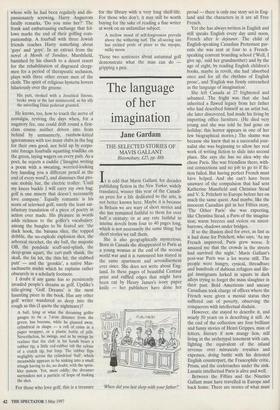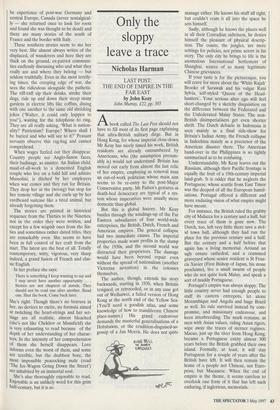The language of her imagination
Jane Gardam
THE SELECTED bD STORIES OF MAVIS GALLANT Bloomsbury, £25, pp. 888 It is odd that Mavis Gallant, for decades publishing fiction in the New Yorker, widely translated, winner this year of the Canadi- an prize for a life dedicated to the arts, is not better known here. Maybe it is because in Britain we are wary of short stories and she has remained faithful to them for over half a century; or at any rate faithful to intense novels from four to 40 pages long, which is not necessarily the same thing; but short stories we call them.
She is also geographically mysterious. Born in Canada she disappeared to Paris as a young woman at the end of the second world war and it is rumoured has stayed in the same apartment and arrondisement ever since. She does not write about Eng- land. In these pages of beautiful Centaur print and ruffled edges that might have been cut by Henry James's ivory paper knife — her publishers have done her `When did you last sleep with your father?' proud — there is only one story set in Eng- land and the characters in it are all Free French.
Yet she has always written in English and still speaks English every day until noon, French after le dejeuner. The child of English-speaking Canadian Protestant par- ents she was sent at four to a French- speaking convent boarding school ('Well, I give up,' said her grandmother) and by the age of eight, by reading English children's books, maybe in revolt, she had 'absorbed once and for all the rhythms of English prose', and 'English was firmly entrenched as the language of imagination'.
She left Canada at 27 frightened and ashamed. The fright was that she had inherited a flawed legacy from her father who had described himself as an artist but, she later discovered, had made his living by importing office furniture. (He died very young and she was told he had gone on holiday; this horror appears in one of her few biographical stories.) The shame was because she knew that as a successful jour- nalist she was beginning to allow her real work of writing fiction to slide into second place. She says she has no idea why she chose Paris. She was friendless there, with- out connections and no job to go to if fic- tion failed. But having perfect French must have helped. And she can't have been unaware of the compulsion that had sent Katherine Mansfield and Christina Stead and V. S. Pritchett to Europe before her on much the same quest. And maybe, like the innocent Canadian girl in her Fifties story, `The Other Paris' she was expecting, like Christina Stead, a Paris of the imagina- tion; warm breezes and violets on street- barrows, shadows under bridges.
If so the illusion died for ever, as fast as it had done for Pritchett, who says, 'As my French improved, Paris grew worse. It amazed me that the crowds in the streets had survived the night.' Mavis Gallant's post-war Paris was a lot worse still. The people were hungry, cynical, threadbare and hundreds of dubious refugees and ille- gal immigrants lurked in squats in dark alleys trying to forget the mass slaughter in their past. Bold Americans and uneasy Canadians took charge of offices where the French were given a menial status they suffered out of poverty, observing the conquerors with intellectual disdain.
However, she stayed to describe it, and nearly 50 years on is describing it still. At the end of the collection are four brilliant and funny stories of Henri Grippes, man of letters, literary if now mangy lion, still living in the archetypal tenement with cats, fighting the equivalent of the inland revenue over minuscule royalties and expenses, doing battle with his detested English counterpart, the Francophile critic, Prism, and the cockroaches under the sink. Lunatic intellectual Paris is alive and well.
Between the Fifties and the Nineties Gallant must have travelled in Europe and back home. There are stories of what must be experience of post-war Germany and central Europe, Canada (never nostalgical- ly — she returned once to look for roots and found she was thought to be dead) and there are many stories of the south of France and the border with Italy.
These southern stories seem to me her very best. She almost always writes of the displaced, of wanderers and here they are thick on the ground, ex-patriot communi- ties endlessly discussing who and what they really are and where they belong — but seldom truthfully. Even in the most terrify- ing times, the creeping edge of war, she sees the ridiculous alongside the pathetic. The riff-raff sip their drinks, stroke their dogs, ride up and down their steep stony gardens in electric lifts like coffins, dining with one another to the same old shrieking jokes (Walter, it could only happen to you!'), waiting for the telephone to ring. They are all really asking, 'What is nation- ality? Patriotism? Europe? Where shall I be buried and who will see to it?' Peasant servants observe this rag-bag and cannot comprehend.
When wages fizzled out they disappear. Country people see Anglo-Saxon faces, their badinage, as sinister. An Italian child, maid-of-all-work to a demented English couple who live on a bald hill and admire Mussolini, is ditched by her employers when war comes and they run for Britain. They drop her at the (wrong) bus stop for her remote village and she curls up by her cardboard suitcase like a tired animal, but already forgetting them.
The stories are printed in historical' sequence from the Thirties to the Nineties, not in the order they were written, and except for a few wispish ones from the Six- ties and sometimes rather dated titles, they are remarkably even. She seems to have been in full control of her craft from the start. The latest are the best of all. Totally contemporary, witty, vigorous, very sharp indeed, a grand fusion of French and clas- sic English.
In her preface she says:
There is something I keep wanting to say and I may never have another opportunity . . . Stories are not chapters of novels. They should not be read one after another. Read one. Shut the book. Come back later.
She's right. Though there's no bravura in her, no devices to excite, no formula aimed at twitching the heart-strings and her set- tings are all realistic, almost bleached (she's not like Chekhov or Mansfield) she is very exhausting to read because of the depth of her understanding of her charac- ters. In the intensity of her comprehension of them she herself disappears. Love informs even the worst of them, and some are terrible, but the drabbest bore, the most impossible peacocking male (read The Ice-Wagon Going Down the Street') are inhabited by an immortal soul.
She's also thoroughly enjoyable to read. Enjoyable is an unlikely word for this grim half-century, but it is so.



































































 Previous page
Previous page